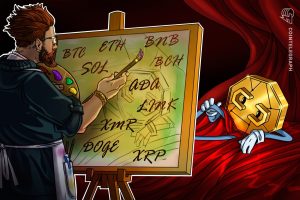
Aragon, one of the oldest open-source frameworks for launching decentralized autonomous organizations (DAOs), today announced that it’s launching its new tech stack on the Polygon network.
Last month, Aragon introduced a new tool kit for spinning up DAOs, which includes the modular Aragon OSx protocol and Aragon App.
Importantly, it requires no coding skills, minimizing technical barriers and allowing users to painlessly design important DAO functionality, such as creating proposals, casting governance votes, and onboarding new community members.
“This is huge for the next generation of DAOs,” Aragon’s head of growth Anthony Leutenegger told Decrypt. “This is especially great for developing countries, who need this type of technology the most. For just cents, people can organize themselves, launch and manage their DAO without needing to code, and do it all on-chain.”
According to Leutenegger, today DAOs are required to use several different protocols and platforms to meet their governance needs, which is “one of the biggest pain points.”
Launching this new toolkit on Polygon also comes with its own set of advantages. Polygon, billed as an interoperability and scaling framework for building Ethereum-compatible blockchains, offers cheaper and faster transactions than Ethereum.
“We are very excited that the leading DAO provider and one of the most important projects in our industry Aragon has launched their highly anticipated new protocol and app on Polygon, making on-chain governance accessible to everyone in the world,” Polygon Labs co-founder Sandeep Nailwal said in a statement.
Its scalability features helped Polygon emerge as a crucial platform for scaling blockchain protocols that handle a large number of transactions. Some of the Web3 projects that rely on Polygon include gaming DAO Aavegotchi, which uses the protocol to mint its NFTs and fuel its metaverse, and Lens, a protocol for building decentralized social media networks.
Alongside increasing speeds, launching on Polygon will also lower the cost of voting and executing governance proposals. “If votes cost $20 or $30 every time, it’s likely that you’ll see a drop off in voters,” Aragon said in a prepared statement. “Polygon helps solve this with extremely low-cost gas fees.”
This, in turn, may improve voter participation among governance token holders within a DAO.
By fixing the existing weak points in DAOs’ structures, Leutenegger says Aragon “can decrease participation and voter apathy and make sure everyone gets the right information they need to make the best decision for their DAO.”
Aragon continues to iterate
In the roadmap presented last month, the Aragon team also outlined several key efforts aimed at further development of the first iteration of its new tech stack.
These include adding more functionality for the Aragon App with a smart contract composer, providing more custom functionality through Aragon’s SDK, making it easier for decentralized applications (dApps) to tap into the protocol, as well as building more governance plugins for delegate voting and subDAO capabilities.
Additionally, the Aragon team plans to add the ability to import users’ existing tokens, while also adding more chains alongside Polygon in the near future.
“Our top priority right now is to keep enhancing the functionality of the App, but we’re also studying demand to determine which chain to launch next,” Aragon CTO Carlos Juarez told Decrypt. “Our current strategy is to move towards a chain we are confident we can give full support.”
According to Juarez, Aragon is also closely looking at the developments around zkEVM—yet another highly-praised Ethereum scaling solution.
“At the end of the day, we’ll deploy wherever we see traction and are confident we’ll be able to offer a great product,” he said.















